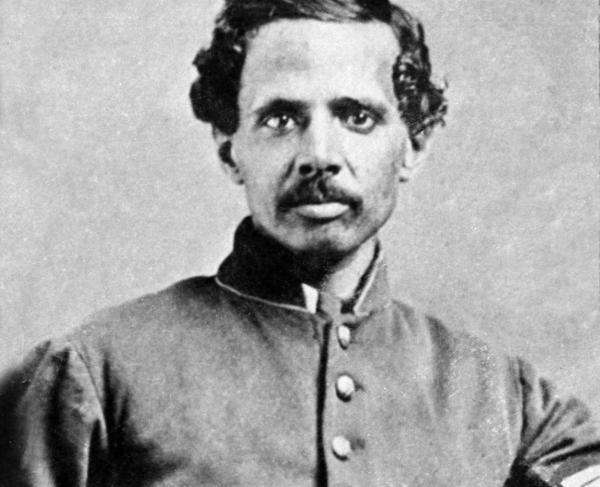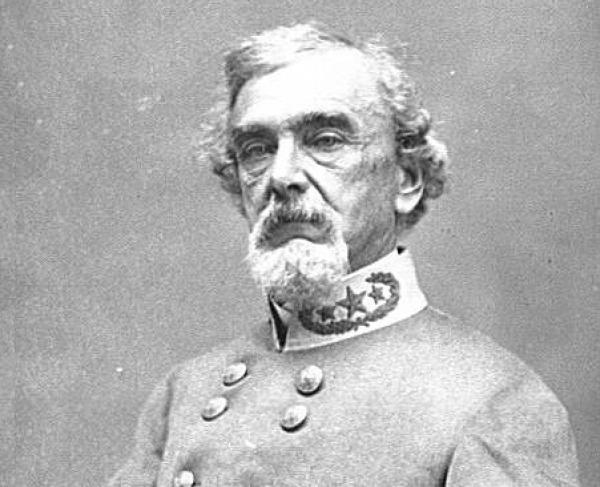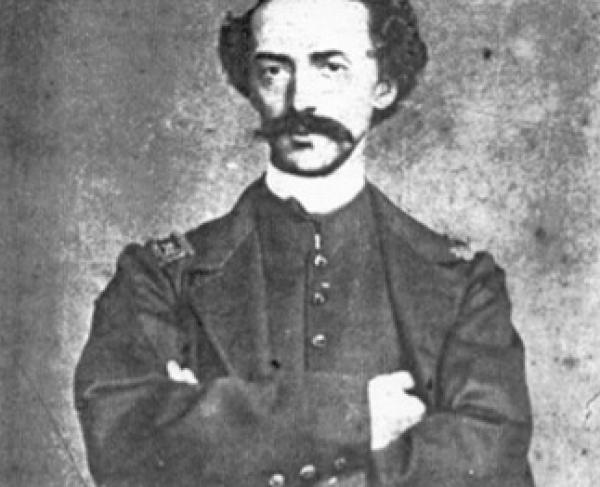Powhatan Beaty

While born into slavery in Richmond, Virginia, on October 8, 1837, Powhatan Beaty and his family forged a path to freedom, settling in the free state of Ohio by 1849. There, in the city of Cincinnati, he attended school and fell in love with the stage when he made his debut in a school concert. Although his heart was with the theater, he entered into the craft of cabinetmaking when he finished school.
When the war began, Cincinnati went on high alert — with only the Ohio River providing separation from slaveholding Kentucky. Beaty’s entry into service followed Confederate invasions into Union territory at places like Antietam, Maryland, and Perryville, Kentucky. Coerced to do so by the so-called Black Brigade, he began his Civil War experience constructing defenses for Cincinnati alongside several other able-bodied black men from the area. Union Maj. Gen. Lew Wallace credited these men — “not the guns” — with saving the city from Confederate attack.
Presented with the opportunity to enlist in a Union field regiment, Beaty jumped at the chance. He enlisted on June 7, 1863, as a private. Only two days later, he was promoted to sergeant and placed in charge of a squad of 47 new soldiers. Arriving in Columbus on June 15, the Ohio recruits learned of New England’s quickly filled black regiments, including the renowned 54th Massachusetts. In response, Ohio petitioned the War Department to create its own such unit. On June 17, Beaty and his company became the first members of the 127th Ohio, which was re-designated the 5th United States Colored Infantry Regiment in November of that same year.
The regiment first saw action at Sandy Swamp on December 8, 1863. Transferred to the main Richmond-Petersburg Campaign, they participated in the capture of City Point on May 4, 1864. They served in the trenches around Petersburg and were part of the assault during the Battle of the Crater on July 30, 1864.
By the time he led his men into the center of the Confederate fortifications at New Market Heights on September 29, 1864, Beaty had been promoted to first sergeant. The attack was met by extensive Confederate fire and resulted in Union retreat, during which Company G’s color bearer was killed and Beaty returned some 600 yards under enemy fire to retrieve the flag. Of the company’s eight officers and 83 enlisted men who went into battle, only 16 enlisted men, including Beaty, survived the attack unwounded. With no officers remaining, Beaty took command of the company and led it through a second charge, which successfully drove the Confederates from their positions. By the end of the battle, over fifty percent of the black division had been killed, captured, or wounded. For his actions, Beaty was later awarded the Medal of Honor.
His regimental commander, twice recommended Beaty for promotion to commissioned officer, yet nothing came of the requests. By December 1864, the unit was assigned to the newly formed XXV Corps and took part in the assaults on Fort Fisher, North Carolina, then turned north as part of Maj. Gen. William T. Sherman’s Campaign of the Carolinas. They were present at Bennett Place for the surrender of Confederate Gen. Joseph E. Johnston’s army on April 26, 1865 and were mustered out of service on September 20, 1865. Beaty had participated in 13 battles and multiple skirmishes by the time he left the army.
Following the war, Beaty returned to Cincinnati and married Mary C. Lee. He returned to cabinet making but also reconnected with his love of acting. By the mid-1880s he had connected with prominent African American Shakespearean actress Henrietta Vinton Davis. Together, they put on a large musical and dramatic festival, featuring selected scenes from Macbeth, with the pair in the leading roles. The duo took to the road and put on performances for packed houses. Frederick Douglass was even in attendance for one of his shows in Washington. Additionally, his life experiences were echoed in his artistry when he wrote a play that focused on the transition from slavery to freedom.
In 1888, Beaty became the drama director of the Literary and Dramatic Club of Cincinnati, a club that he had helped form. He gave public readings for charitable causes and became a well-known elocutionist among Cincinnati’s African American community.
He passed on December 6, 1916, at the age of 79 and is buried at the Union Baptist Cemetery in Cincinnati.
Related Battles
4,150
1,750
5,739
7,997
3,798
1,491


